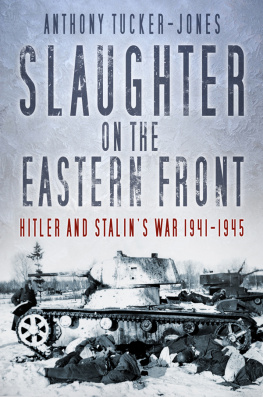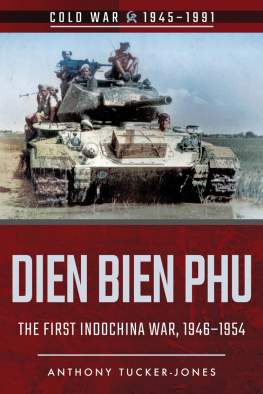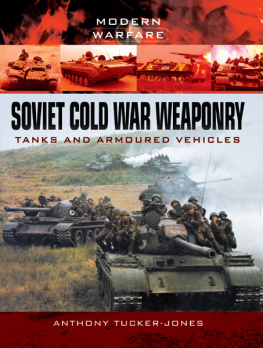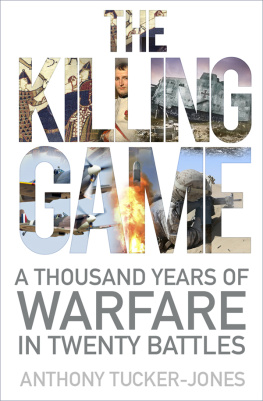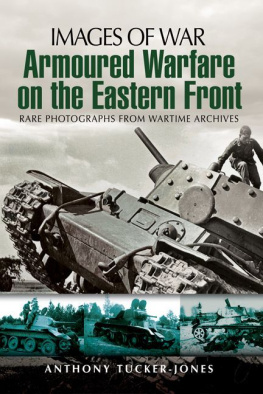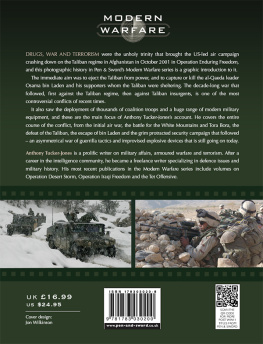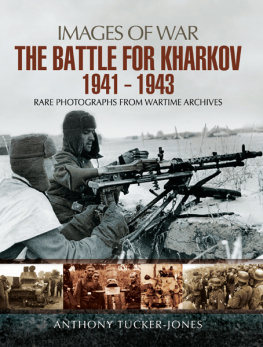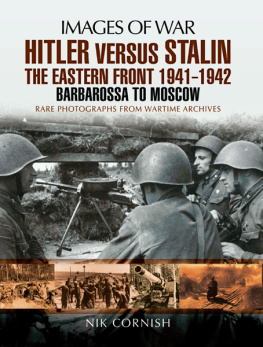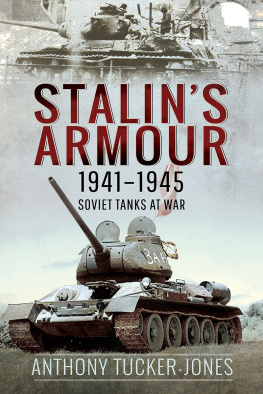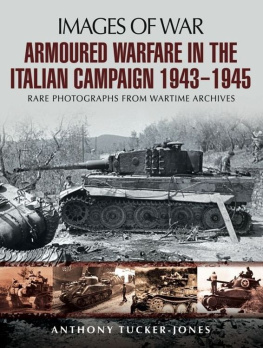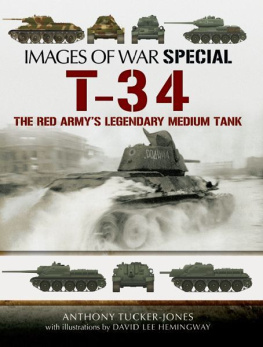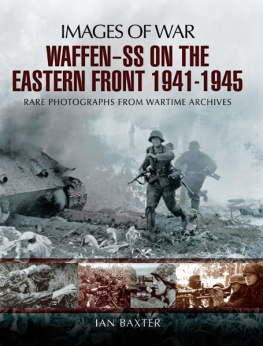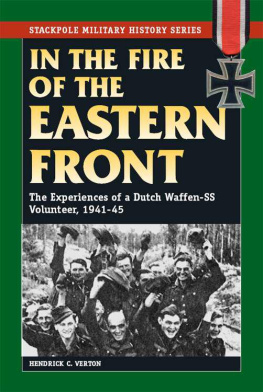Tucker-Jones - Slaughter on the Eastern Front: Hitler and Stalins war 1941-1945
Here you can read online Tucker-Jones - Slaughter on the Eastern Front: Hitler and Stalins war 1941-1945 full text of the book (entire story) in english for free. Download pdf and epub, get meaning, cover and reviews about this ebook. City: Soviet Union, year: 2019, publisher: The History Press, genre: Non-fiction. Description of the work, (preface) as well as reviews are available. Best literature library LitArk.com created for fans of good reading and offers a wide selection of genres:
Romance novel
Science fiction
Adventure
Detective
Science
History
Home and family
Prose
Art
Politics
Computer
Non-fiction
Religion
Business
Children
Humor
Choose a favorite category and find really read worthwhile books. Enjoy immersion in the world of imagination, feel the emotions of the characters or learn something new for yourself, make an fascinating discovery.
- Book:Slaughter on the Eastern Front: Hitler and Stalins war 1941-1945
- Author:
- Publisher:The History Press
- Genre:
- Year:2019
- City:Soviet Union
- Rating:3 / 5
- Favourites:Add to favourites
- Your mark:
- 60
- 1
- 2
- 3
- 4
- 5
Slaughter on the Eastern Front: Hitler and Stalins war 1941-1945: summary, description and annotation
We offer to read an annotation, description, summary or preface (depends on what the author of the book "Slaughter on the Eastern Front: Hitler and Stalins war 1941-1945" wrote himself). If you haven't found the necessary information about the book — write in the comments, we will try to find it.
Slaughter on the Eastern Front: Hitler and Stalins war 1941-1945 — read online for free the complete book (whole text) full work
Below is the text of the book, divided by pages. System saving the place of the last page read, allows you to conveniently read the book "Slaughter on the Eastern Front: Hitler and Stalins war 1941-1945" online for free, without having to search again every time where you left off. Put a bookmark, and you can go to the page where you finished reading at any time.
Font size:
Interval:
Bookmark:


First published in 2017
The History Press
The Mill, Brimscombe Port
Stroud, Gloucestershire, GL5 2QG
www.thehistorypress.co.uk
This ebook edition first published in 2017
All rights reserved
Anthony Tucker-Jones, 2017
The right of Anthony Tucker-Jones to be identified as the Author of this work has been asserted in accordance with the Copyright, Designs and Patents Act 1988.
This ebook is copyright material and must not be copied, reproduced, transferred, distributed, leased, licensed or publicly performed or used in any way except as specifically permitted in writing by the publishers, as allowed under the terms and conditions under which it was purchased or as strictly permitted by applicable copyright law. Any unauthorised distribution or use of this text may be a direct infringement of the authors and publishers rights, and those responsible may be liable in law accordingly.
EPUB 978 0 7509 8313 6
Original typesetting by The History Press
eBook converted by Geethik Technologies
General Mikhail Ivanovich Kazakov stood on the edge of Tashkent Airfield. It was warm this time of year temperatures in Uzbekistan reached a stifling 34C. Out in the sun it did not take long for the standard Red Army issue khaki cotton shirt and single-breasted tunic to become soaked. He dug a handkerchief from his pocket and mopped his brow and then his neck.
Kazakov was not a fan of the Soviet Central Asian Republics. Career wise, the region was a complete backwater European Russia or Siberia was where most officers wanted to be. Tashkent lacked the opportunities of, say, Moscow, Minsk, Kharkov and Leningrad, or even Vladivostok, for that matter.
Kazakov had found himself ordered to Moscow in early June 1941 to brief the General Staff on the readiness of the Central Asian Military District. He reassured himself it was a routine trip, but in the back of his mind there was a nagging doubt. A few years ago, such an order could mean a brief and often painful interview with Stalins dreaded internal security forces, followed by the Gulag or firing squad. Kazakov had heard what had happened to tough Red Army veterans like Konstantin Rokossovsky. He spent three vicious years in the Gulag, where he had been subjected to mock executions and had his ribs broken and his teeth knocked out. Only because Stalin had need of such men had Rokossovsky been released. Kazakov later, very briefly, worked for Rokossovsky and was highly impressed by the man.
He knew war with neighbouring China to the east was highly unlikely. The country had been brought to its knees by decades of violent internal political turmoil. Besides, China was a good trade partner and was distracted by recent Japanese aggression in Manchuria and Mongolia. To the south, Kazakov appreciated that no one in their right mind would tangle with the bloodthirsty tribes of Afghanistan. Its greatest value was as a useful buffer to British colonial interests in India. Only Iran, to the south-west, was of interest to Moscow because of its vast oil reserves and access to the Arabian Sea. The Red Army watched with amusement as the British and Americans squabbled over oil rights in the region.
Kazakov lit up a Machorka cigarette just to calm any last-minute nerves before his flight. He was used to the high nicotine content, which was three times that of regular tobacco. Many officers preferred European cigarettes, but in Tashkent they were not so easy to get hold of. He pondered his trip. It was slightly worrying that he had been at the militarys central headquarters in Moscow earlier in the year and now six months on he had been called back.
His relationship with the military district commander was good, so he was not aware of any problems in the chain of command. In the Red Army, where bullying was institutionalised, it paid to have a good relationship with your immediate superior, otherwise it could make for a very unpleasant working environment and a short-lived career. If anything, Kazakov was slightly envious of his 42-year-old boss, Major General Sergei Trofimenko. He was a veteran of the Russian Civil War and in recent years had been involved in the campaigns in Poland and Finland. After promotion, Trofimenko had arrived to take command of the Central Asian Military District in early 1941.
Across the runway the loadmaster of a DB long-range bomber motioned to Kazakov. This aircraft had proved to be vulnerable to nationalist fighters during the Spanish Civil War and, in many instances, was now relegated to transport duties. He stubbed out his cigarette and straightened his furashka officers peaked cap.
Flying north, the pilot picked up the Trans-Siberian Railway as an easy way to navigate to Moscow, and below Kazakov saw trainload after trainload of troops from the Soviet Far East, all heading west. Kazakov was unaware of any large-scale military manoeuvres, so Stalin must be gathering his armies it seemed war was brewing in Europe. Now he knew why he had been summoned to Moscow.
Meanwhile, in his office in the Central Arbat District of Moscow, General Filipp Golikov, head of Military Intelligence, knew exactly what was going on. He had watched as Adolf Hitler massed three powerful army groups in Prussia, Nazi-occupied western Poland and then Romania. There had also been unending border violations by German spy planes. His credible and well-placed sources all indicated that Hitler was poised to strike between mid-May and mid-June 1941. Golikov had direct access to the Boss in the Kremlin and was regularly at his side. When it came to briefing Joseph Stalin, he did not even have to bother going through the General Staff.
The Soviet Union was well prepared to face any threat posed by Hitler, or so he thought. Golikov was relatively new in the post and he understood that it was best not to disagree with the Boss. He had replaced Ivan Proskurov, who had been sacked for not sugar-coating the intelligence about Hitlers intentions. Proskurov had gone the way of his six predecessors and would face a firing squad in four months time.
Golikov appreciated that being head of Military Intelligence for someone like Stalin was a poisoned chalice. To survive the rigours of life in the Red Army, you always kept your head down. The Boss, naturally supported by Golikov, had very set views on what was going on. In his mind, Hitlers build-up was all part of an elaborate plan to force England to the negotiating table. Therefore, it was very clear to Stalin and Golikov that war with Germany was not imminent.
At Wnsdorf, south of Berlin, Colonel Eberhard Kinzel, head of German intelligence-gathering in Eastern Europe, was slightly worried about his conclusions which had been backed by the Luftwaffes intrusive reconnaissance flights over the Soviet Union. These had confirmed two very important things: firstly, the Red Army seemed to have no strategic reserves east of their old frontier, and this posed the question, where were Stalins reserves? Secondly, the Red Air Force was very obligingly lining its aircraft up wingtip to wingtip on its forward airfields. This meant that the Luftwaffe would be able to easily destroy the Red Air Force on the ground and once Hitlers blitzkrieg had stormed through eastern Poland, the road to Moscow would be wide open.
Kinzel had in recent months made a very thorough study of the Red Army deployed in the border areas, and overall it was in a lamentable state. Everything indicated that a swift victory could be achieved. His superior, General Franz Halder, Chief of the German General Staff, was very pleased with his work in building up a meticulous picture of Stalins defences. However, Kinzel had also studied Stalins manpower reserves and industrial strength. Should Hitler attack the Soviet Union, the war would clearly be a race against time, not only against the Russian winter but also Stalins mobilising reserve armies.
Next pageFont size:
Interval:
Bookmark:
Similar books «Slaughter on the Eastern Front: Hitler and Stalins war 1941-1945»
Look at similar books to Slaughter on the Eastern Front: Hitler and Stalins war 1941-1945. We have selected literature similar in name and meaning in the hope of providing readers with more options to find new, interesting, not yet read works.
Discussion, reviews of the book Slaughter on the Eastern Front: Hitler and Stalins war 1941-1945 and just readers' own opinions. Leave your comments, write what you think about the work, its meaning or the main characters. Specify what exactly you liked and what you didn't like, and why you think so.

